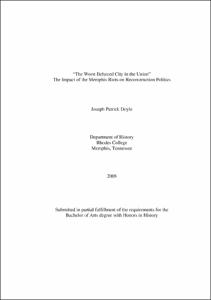Please use this identifier to cite or link to this item:
http://hdl.handle.net/10267/1848Full metadata record
| DC Field | Value | Language |
|---|---|---|
| dc.contributor.author | Doyle, Joseph (Joe) | - |
| dc.date.accessioned | 2008-06-13T18:49:52Z | - |
| dc.date.available | 2008-06-13T18:49:52Z | - |
| dc.date.issued | 2008-06-13T18:49:52Z | - |
| dc.identifier.uri | http://hdl.handle.net/10267/1848 | - |
| dc.description | Joseph Doyle granted permission for the digitization of his paper. It was submitted by CD. | en_US |
| dc.description.abstract | In the first three days of May, 1866, an impassioned white mob besieged the African-American community of Memphis, leaving nothing but death and destruction in its path. Existing scholarship on the topic either fails to place the Massacre in the context of national politics or contends the event lacked importance in comparison to the New Orleans Riots, which occurred on July 30, 1866. This thesis expands the prevailing understanding of the Memphis Massacre from two distinct perspectives. First, it places the tragedy within the context of Congressional Reconstruction. Politicians, both Democrats and Republicans, developed a wide variety of plans for redeveloping the South and reunifying the nation. This study investigates the connection between the Memphis Massacre and Reconstruction policy. Second, this research augments and challenges the analyses of prior historians by examining the Massacre from the perspective of post-war national and Tennessee politics. The Massacre deeply affected the Congressional election of 1866, won overwhelmingly by the radical Republicans. Despite decisive election margins in the fall of 1866, the Radicals began losing national power within two years of the Massacre. Yet in such a short lifespan the Radicals pushed a flurry of legislation through Congress with the assistance of moderate and conservative Republicans. The Memphis Massacre, an event that galvanized northerners, helped place radicals in a position of unmatched power. | en_US |
| dc.description.sponsorship | This honors paper was approved by Dr. Timothy Huebner, Dr. Charles McKinney, Dr. Margaret Carne, and Dr. Lynn Zastoupil. | en_US |
| dc.publisher | Memphis, Tenn. : Rhodes College | en_US |
| dc.rights | Rhodes College owns the rights to the archival digital objects in this collection. Objects are made available for educational use only and may not be used for any non-educational or commercial purpose. Approved educational uses include private research and scholarship, teaching, and student projects. For additional information please contact archives@rhodes.edu. Fees may apply. | - |
| dc.subject | Text | - |
| dc.subject | History, Department of | en_US |
| dc.subject | Honors papers | en_US |
| dc.subject | Student research | en_US |
| dc.title | The Worst Behaved City in the Union:The Impact of the Memphis Riots on Reconstruction Politics | en_US |
| dc.type | Thesis | en_US |
| Appears in Collections: | Honors Papers | |
Files in This Item:
| File | Description | Size | Format | |
|---|---|---|---|---|
| JDoyle_Hon_paper_2008.pdf | 1.15 MB | Adobe PDF |  View/Open |
Items in DSpace are protected by copyright, with all rights reserved, unless otherwise indicated.